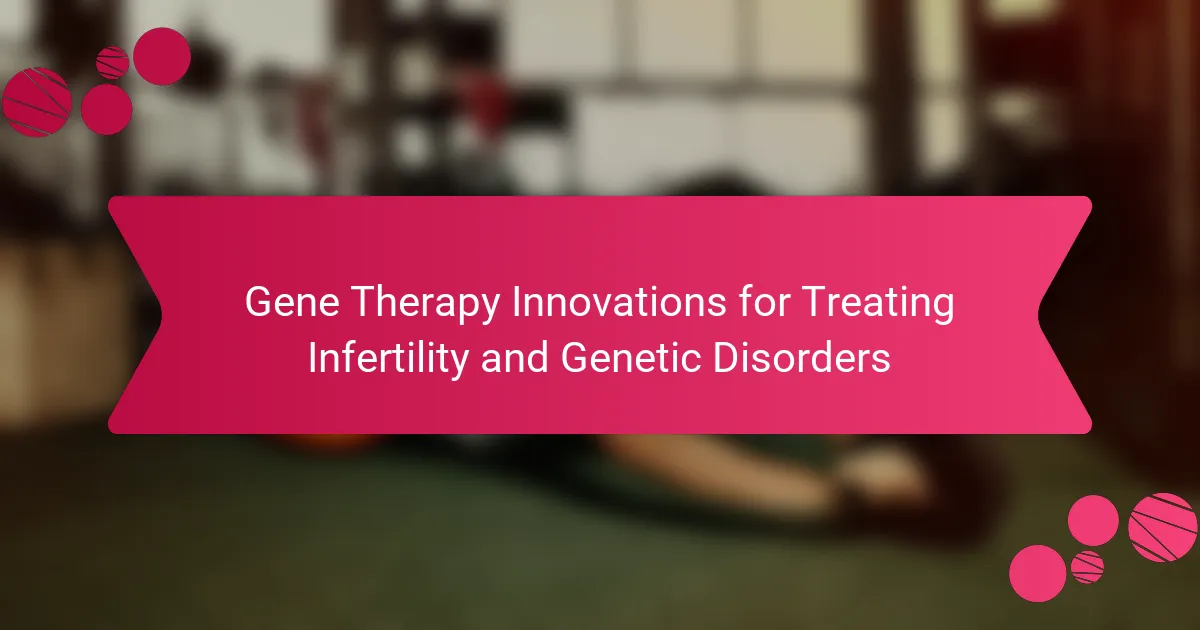Gene therapy innovations are transforming the treatment landscape for infertility and genetic disorders, offering hope for couples facing reproductive challenges. This article explores advancements in gene editing techniques like CRISPR-Cas9, regional variations in therapy application, ethical considerations, and the potential risks associated with these treatments. Additionally, it highlights the importance of informed decision-making for patients considering gene therapy options.
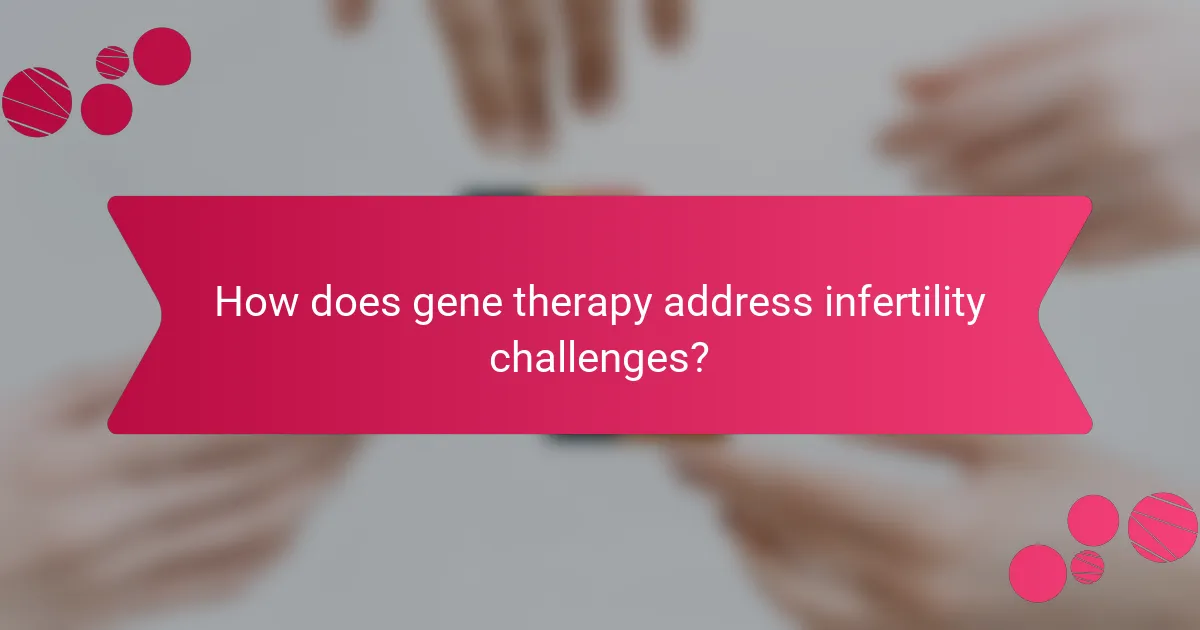
How does gene therapy address infertility challenges?
Gene therapy offers innovative solutions for infertility by targeting genetic disorders that affect reproductive health. It can correct mutations in genes responsible for infertility, enhancing fertility potential. For instance, gene therapy can restore hormonal balance or improve sperm production. Clinical trials have shown promising results, indicating that this approach may significantly improve outcomes for couples facing infertility due to genetic factors. As research progresses, gene therapy may become a standard treatment option in reproductive medicine.
What are the key mechanisms of gene therapy in reproductive health?
Gene therapy employs several mechanisms to address infertility and genetic disorders. It can correct genetic mutations, enhance reproductive function, and improve embryo viability. Techniques like CRISPR-Cas9 enable precise editing of genes, while viral vectors deliver therapeutic genes to target cells. Additionally, gene therapy can modulate immune responses, potentially reducing complications in reproductive health. These innovations hold promise for treating conditions like polycystic ovary syndrome and genetic infertility, offering new hope for affected individuals.
Which genetic factors contribute to infertility that gene therapy targets?
Genetic factors contributing to infertility that gene therapy targets include mutations in genes like CFTR, FMR1, and KAL1. These mutations affect reproductive functions and can lead to conditions such as cystic fibrosis or Kallmann syndrome. Gene therapy aims to correct these mutations, enhancing fertility potential.
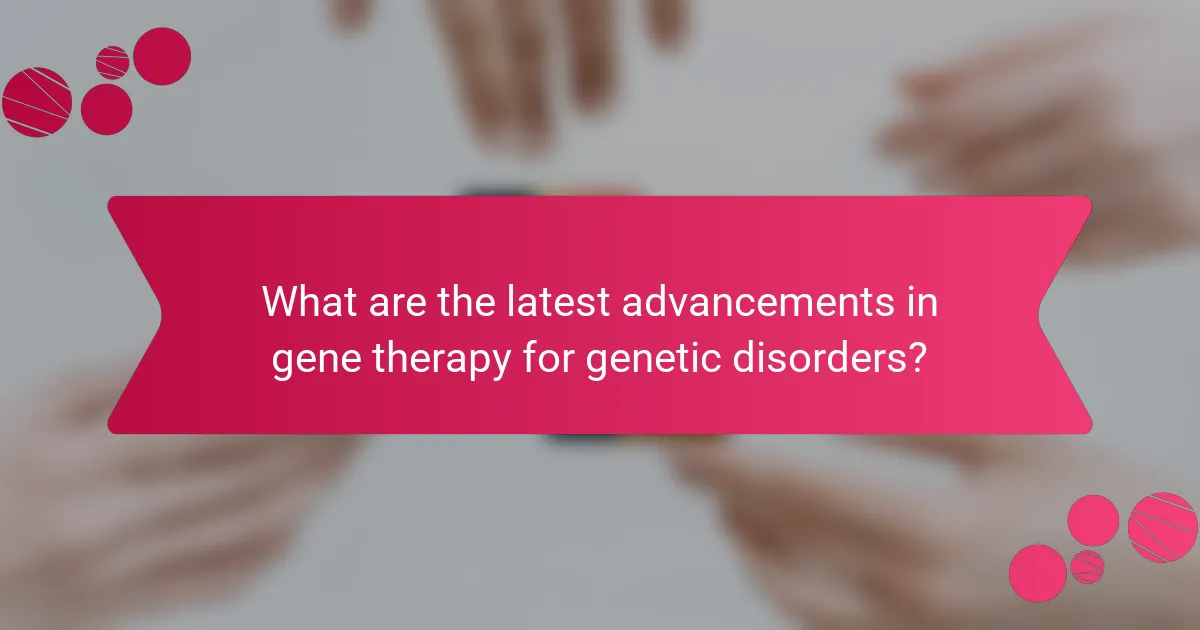
What are the latest advancements in gene therapy for genetic disorders?
Recent advancements in gene therapy have shown promising results for treating genetic disorders and infertility. Innovations include CRISPR-Cas9 techniques that enable precise gene editing, allowing for the correction of mutations responsible for various genetic conditions. Additionally, new delivery methods, such as lipid nanoparticles, enhance the efficacy of gene therapies by improving the targeted delivery of genetic material to affected cells. Trials utilizing adeno-associated viruses (AAV) have demonstrated success in treating disorders like hemophilia and muscular dystrophy, showcasing the potential for long-term benefits. Furthermore, research into gene therapy for infertility has led to the exploration of correcting genetic causes of reproductive issues, offering hope for affected individuals.
How are CRISPR and other technologies revolutionizing treatment options?
CRISPR and other technologies are transforming treatment options for infertility and genetic disorders. These innovations enhance precision in gene editing, allowing for targeted therapies that correct genetic mutations.
CRISPR’s ability to edit genes at specific locations improves success rates in treatments. For instance, researchers have demonstrated its effectiveness in correcting mutations linked to cystic fibrosis and certain types of infertility. Other gene therapy methods, like viral vector delivery, complement CRISPR by providing safe mechanisms for gene transfer.
Emerging technologies, such as base editing and prime editing, further refine gene editing capabilities. Base editing allows for precise single-nucleotide changes, while prime editing enables more extensive modifications without double-strand breaks. These advancements increase the potential for treating previously untreatable genetic conditions.
As a result, the combination of CRISPR and complementary technologies is revolutionizing the landscape of gene therapy, offering hope for many individuals facing infertility and genetic disorders.
What role do clinical trials play in advancing gene therapy innovations?
Clinical trials are essential for validating gene therapy innovations aimed at treating infertility and genetic disorders. They provide critical data on safety, efficacy, and optimal treatment protocols. Through rigorous testing, these trials help identify the most effective gene delivery methods and therapeutic targets. For instance, recent studies have shown that specific gene therapies can significantly improve reproductive outcomes in affected populations. Additionally, clinical trials facilitate regulatory approval, ensuring that new therapies can be safely integrated into clinical practice. The ongoing research in this field continues to expand treatment options and enhance patient care.
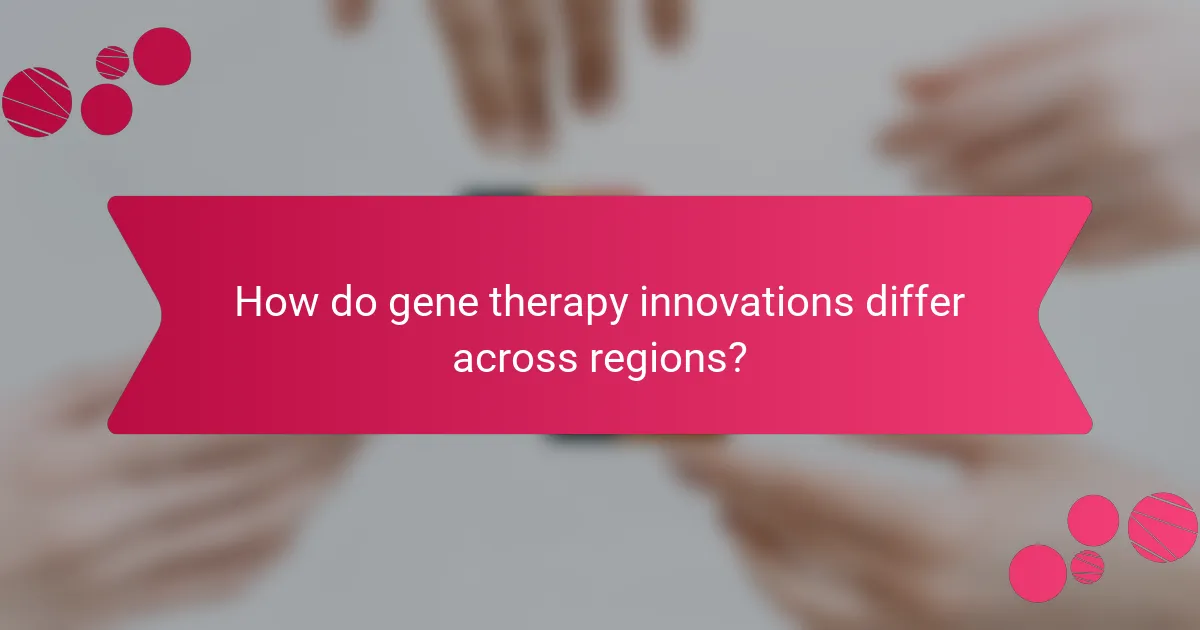
How do gene therapy innovations differ across regions?
Gene therapy innovations for treating infertility and genetic disorders vary significantly across regions due to regulatory environments, funding availability, and research focus. In North America, advanced clinical trials and substantial investment drive rapid development. Europe emphasizes ethical considerations and patient access, resulting in varied implementation rates. Asia, particularly countries like China, showcases fast-tracked approvals and a focus on cost-effective solutions. These regional differences impact the availability and application of innovative therapies, reflecting unique healthcare priorities and societal values.
What are the regulatory challenges in gene therapy for infertility in North America?
Regulatory challenges in gene therapy for infertility in North America include stringent approval processes, ethical considerations, and varying state regulations. The complexity of these regulations can delay access to innovative treatments. For instance, the FDA’s rigorous evaluation criteria ensure safety and efficacy, often extending the timeline for clinical trials. Additionally, ethical concerns surrounding genetic modifications raise public apprehension, influencing regulatory frameworks. The inconsistency in state laws further complicates the landscape, creating barriers for researchers and practitioners.
How does public perception influence gene therapy development in Europe?
Public perception significantly influences gene therapy development in Europe by shaping funding, regulation, and clinical trial participation. Positive public attitudes can lead to increased investment in research and development. Conversely, skepticism or fear may hinder progress and regulatory approvals. Public education on gene therapy’s benefits for treating infertility and genetic disorders is crucial for fostering acceptance. Engaging with communities through transparent communication can enhance trust and support for innovative treatments.
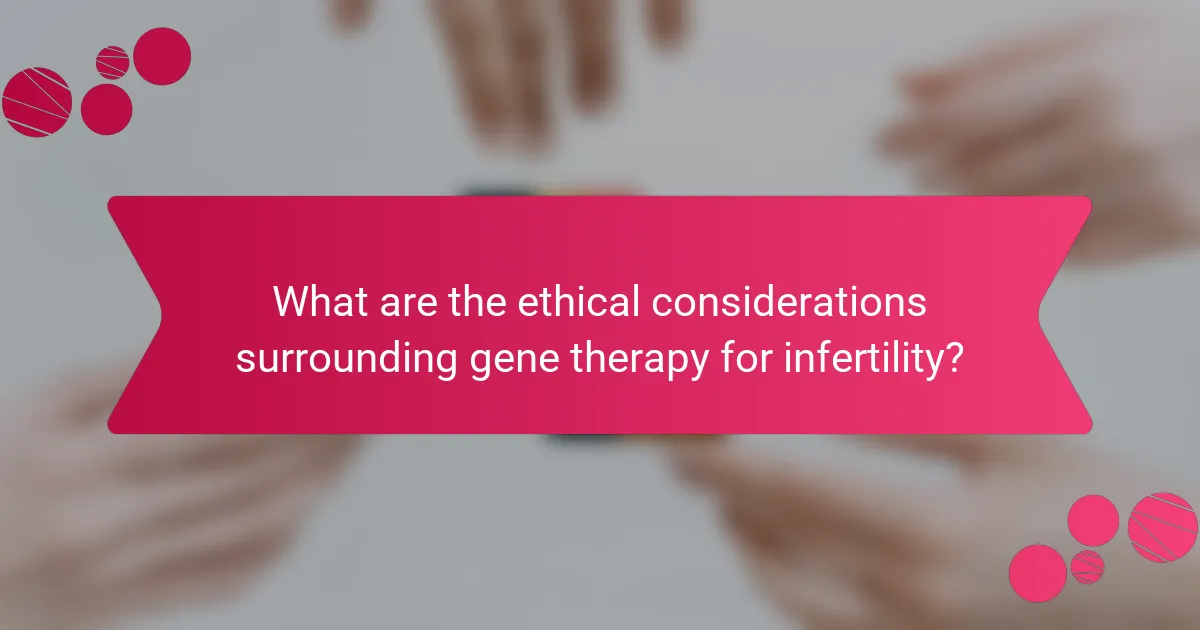
What are the ethical considerations surrounding gene therapy for infertility?
Ethical considerations surrounding gene therapy for infertility include concerns about consent, potential long-term effects, and equity in access. Informed consent is vital as patients must understand risks and implications. The long-term effects of gene modifications remain uncertain, raising questions about unforeseen consequences. Additionally, equitable access to these advanced treatments is essential to prevent disparities in reproductive health. These factors highlight the need for ongoing ethical discourse in the evolving field of gene therapy for infertility.
How do cultural attitudes shape the acceptance of gene therapy?
Cultural attitudes significantly influence the acceptance of gene therapy. Societal beliefs about genetics and medical interventions shape perceptions of safety and ethics. In cultures valuing traditional medicine, acceptance may be lower compared to those embracing technological advancements. Public awareness and education about gene therapy’s benefits can enhance acceptance, especially in addressing infertility and genetic disorders. Moreover, religious beliefs may pose challenges or support depending on interpretations of human intervention in natural processes. Understanding these cultural dimensions is crucial for effective communication and implementation of gene therapy innovations.
What guidelines exist to ensure responsible use of gene therapy?
Guidelines for responsible use of gene therapy include ethical considerations, informed consent, and regulatory compliance. Researchers and clinicians must prioritize patient safety and long-term effects. Transparency in reporting outcomes and potential risks is essential. Collaboration with regulatory bodies ensures adherence to established protocols.
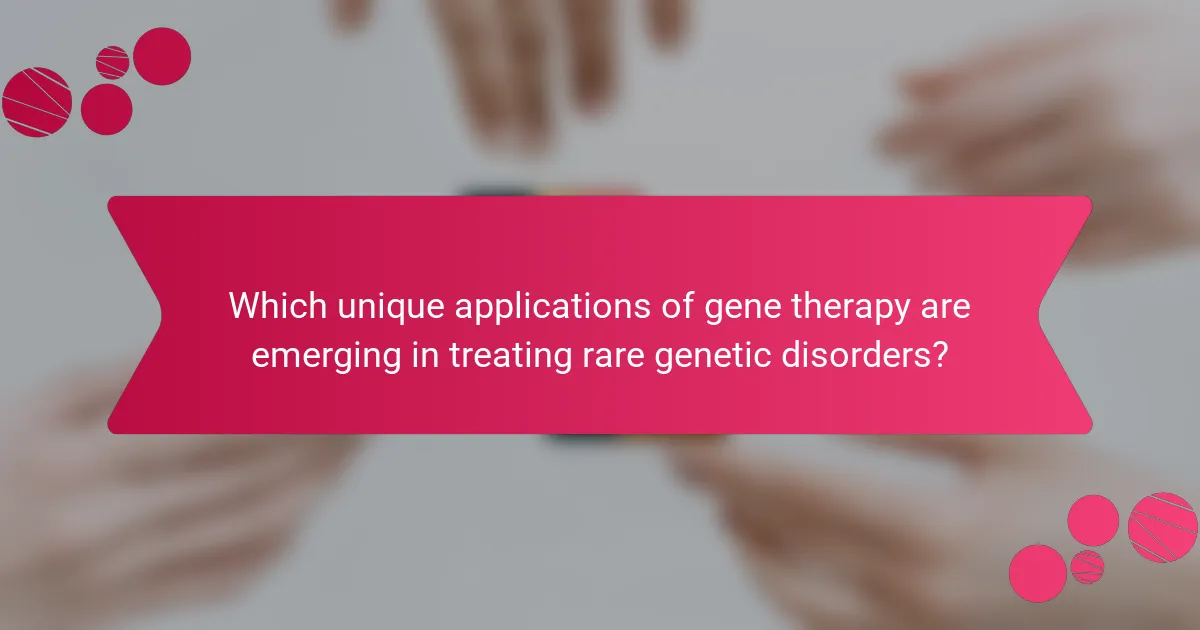
Which unique applications of gene therapy are emerging in treating rare genetic disorders?
Gene therapy is increasingly being applied to treat rare genetic disorders, with innovative approaches emerging. One unique application involves using CRISPR technology to target and edit specific genes responsible for disorders like muscular dystrophy. Another promising method is gene replacement therapy, which introduces functional copies of genes to counteract deficiencies, as seen in conditions like cystic fibrosis. Additionally, RNA interference techniques are being explored to silence harmful genes in diseases such as Huntington’s disease. These advancements indicate a shift towards personalized medicine in treating genetic disorders.
What are some successful case studies of gene therapy in rare conditions?
Gene therapy has shown promising results in treating rare conditions like genetic disorders and infertility. Notable case studies include the successful use of adeno-associated virus (AAV) vectors to treat inherited retinal diseases, restoring vision in patients with specific genetic mutations. Another example is the use of CRISPR technology to correct mutations in the HBB gene for patients with beta-thalassemia, leading to significant improvements in hemoglobin levels. Additionally, gene therapy has been applied to rare forms of inherited infertility, such as Y chromosome microdeletions, showing potential for restoring fertility in affected individuals. These innovations highlight the transformative impact of gene therapy in addressing rare genetic conditions.
How do patient outcomes compare between traditional treatments and gene therapy?
Gene therapy often results in improved patient outcomes compared to traditional treatments for infertility and genetic disorders. Traditional treatments may address symptoms but do not alter underlying genetic issues. Gene therapy can correct genetic defects, leading to long-term solutions. For example, clinical trials show that gene therapy for certain genetic disorders has a success rate exceeding 70%, while traditional methods typically offer lower efficacy. As a result, gene therapy represents a significant advancement in treating these conditions.
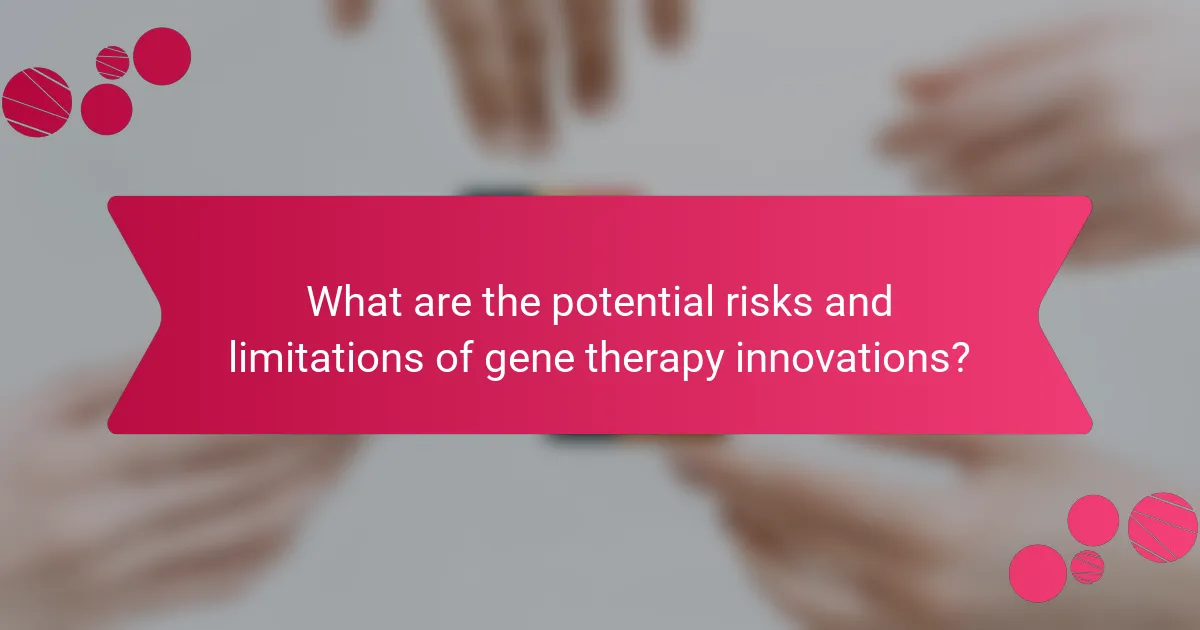
What are the potential risks and limitations of gene therapy innovations?
Gene therapy innovations for treating infertility and genetic disorders carry potential risks and limitations. These include unintended genetic changes, immune reactions, and ethical concerns about long-term effects. Additionally, access and affordability may limit widespread application. The complexity of targeting specific genes can also complicate treatment efficacy.
What side effects should patients be aware of before undergoing gene therapy?
Patients should be aware of potential side effects before undergoing gene therapy, including immune reactions, unintended genetic changes, and specific symptoms related to the targeted condition. Immune responses can lead to inflammation and fever. Unintended genetic changes may cause unforeseen health issues. Additionally, symptoms can vary based on the specific genetic disorder being treated. Monitoring and consultation with healthcare professionals are essential for managing these risks.
How do long-term outcomes of gene therapy compare to conventional methods?
Long-term outcomes of gene therapy often show greater efficacy and fewer side effects compared to conventional methods. Gene therapy can provide permanent solutions for infertility and genetic disorders by targeting the root cause at the genetic level. Conventional treatments may require ongoing management and do not address the underlying genetic issues. Studies indicate that gene therapy can lead to sustained improvements in patient health, significantly enhancing quality of life.
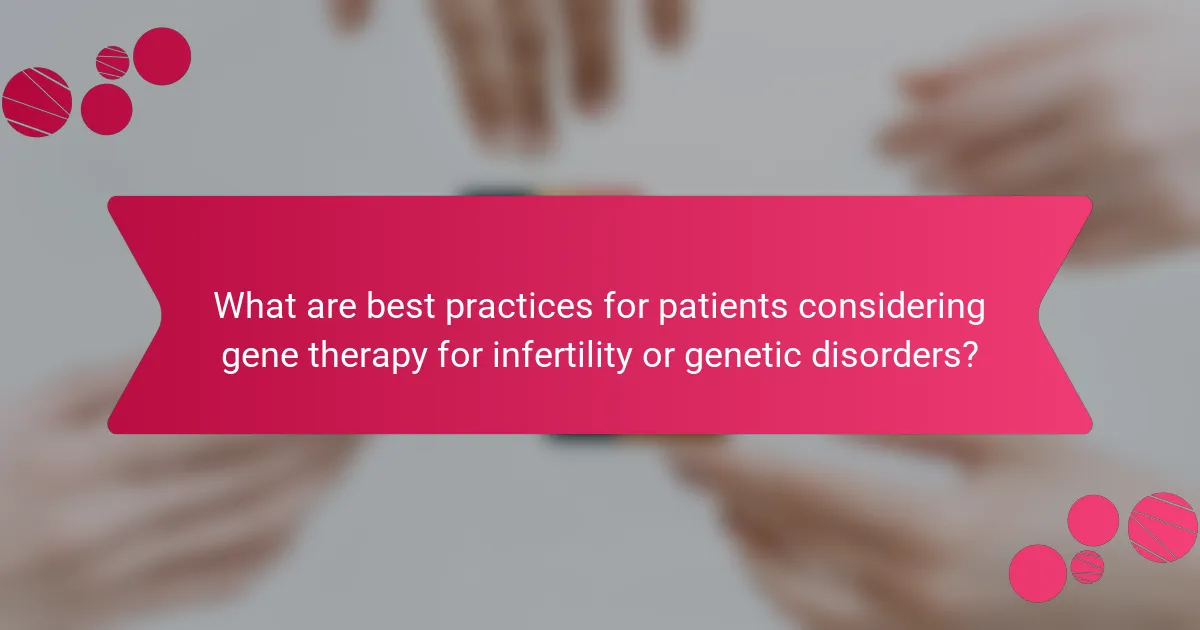
What are best practices for patients considering gene therapy for infertility or genetic disorders?
Patients considering gene therapy for infertility or genetic disorders should prioritize informed decision-making. First, consult with a specialist experienced in gene therapy. Evaluate the specific genetic condition and potential benefits of therapy. Understand the risks and long-term implications of treatment. Assess the availability of clinical trials, which may provide access to cutting-edge therapies. Review current research and success rates associated with gene therapy for your condition. Lastly, consider emotional and ethical implications, ensuring support systems are in place.
How can patients prepare for consultations regarding gene therapy options?
Patients can prepare for consultations about gene therapy options by gathering relevant medical history and questions. Compile a list of current symptoms and treatments, including any previous genetic testing results. Understand the specific gene therapy innovations available for infertility and genetic disorders. Research potential benefits and risks associated with these therapies. Consider discussing family planning and genetic counseling options with healthcare providers to clarify expectations and outcomes.
What questions should patients ask their healthcare providers about gene therapy?
Patients should ask their healthcare providers about the risks, benefits, and success rates of gene therapy for infertility and genetic disorders. Inquire about specific gene targets, treatment duration, and potential side effects. Understanding the ethical implications and long-term monitoring requirements is also essential. Additionally, discuss alternative treatment options and the provider’s experience with gene therapy procedures.
